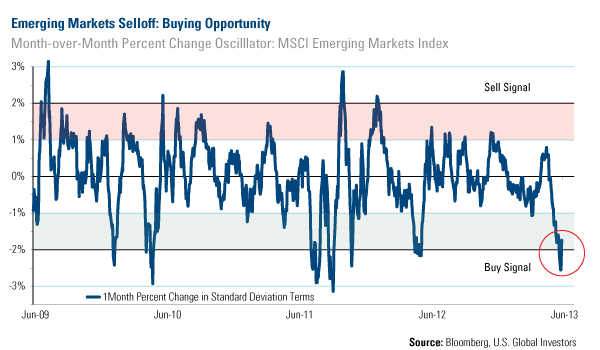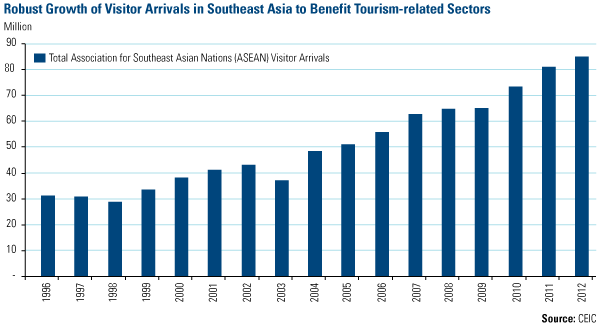Emerging Markets Radar (July 1, 2013)
Strengths
- The Russian ruble fared well relative to the emerging market currency sell-off, as oil was unaffected by the risk-off environment that ensued after Bernanke’s comments last week. In addition to the strength in oil, the ruble has stabilized with support from the demand of state-controlled exporters who bid up the currency as they prepared for Friday’s ruble-denominated tax payment deadline.
- Brazil’s central government budget surplus for the month of May was reported above analysts’ consensus, as the government continues to cut costs to meet a primary surplus goal of 2.3 percent of gross domestic product (GDP) this year. Finance Minister Guido Mantega said Brazil will trim spending to meet this year’s fiscal target, as the government implements measures to slow inflation.
- The People’s Bank of China (PBOC), the central bank of China, said it will maintain the interbank money market rate at a reasonable level, and China’s banking system has plenty of liquidity. It predicted interbank liquidity tightness will fade after a panicked interbank rate hike earlier in the week. The overnight Shanghai Interbank Offered Rate (SHIBOR) had dropped to 4.94 percent from the recent high of 13.4 percent after the PBOC injected liquidity into the banks.
- Gasoline demand in China remained robust, up by 13.7 percent in May, though crude demand growth was at 4.9 percent.
- China’s State Council made the decision to renovate shantytown in China, which offers profitable opportunities for developers and home appliances. It also improves living conditions for the residents.
- China asked local governments to study policy support for the development of solar energy in their areas and to explore new markets for the distribution of solar technology.
- Singapore’s April to May IP was up 2.1 percent in growth, better than the market consensus of 2 percent, and rising 1.2 percent sequentially.
- The Philippines’ current account surplus soared to 5.3 percent of GDP in the first quarter this year. Besides most of the current account surplus being attributed to resilient remittance, it was surprising to note that the trade deficit was 42.9 percent lower year-over-year. This helps to alleviate fears that the recent fund net outflow can cause instability in its currency.
- South Korea’s current account surplus widened to a record, with favorable exports to the U.S. and other emerging markets. The news is welcome as it dissipates fears of a weaker Japanese yen, reducing the competitiveness of South Korean exports. As a result, the finance minister increased the country’s 2013 GDP forecast to 2.7 percent from 2.3 percent.
Weaknesses
- Earlier in the week, the outflows from emerging markets reached their fastest pace in two years as the prospect of less global stimulus depressed currencies from India to Brazil. Nearly $20 billion left emerging market funds this month up until June 26, the largest monthly outflows recorded, according to Morgan Stanley. Despite the International Monetary Fund (IMF) cut in its prediction for developing nation growth to 5.1 percent from 5.5 percent, the growth prospects remain very favorable when compared with the 1.2 percent projection for advanced economies. Thus, the selloff in emerging markets, which has left stocks deeply in oversold territory, may provide a compelling entry point for contrarian investors.
- India’s rupee plunged to a record 60.76 per dollar as investors fled currencies in countries with sizeable current account deficits in favor of the U.S. dollar. The currency weakness adds to inflationary pressures as the government may widen the fiscal deficit to make up for lower monetary flexibility, without having a positive effect on the current account deficit.
- Mainland news said some Chinese banks have tightened mortgage lending amid the liquidity crunch. Several banks in first-tier and second-tier cities like Beijing, Shenzhen and Hangzhou have removed the lending rate discount for first-time home buyers.
- Fitch expects more than 1.5 billion yuan in wealth management products (WMP) to mature next week. Chinese banks are asked to de-leverage from WMP and trust loan investments, which is part of the credit expansion curb to rein in financial risks.
- Thailand’s May exports were down 5.25 percent versus up 2.89 percent in April, coming in below the consensus -4.7 percent. The weakness was mainly from the slump in exports of agricultural and electronic goods. Imports fell 2.1 percent.
- Bond yield went up across Asia, including China, which will increase the cost of corporate financing.
- Hong Kong’s exports growth unexpectedly relapsed to a 1 percent decline in May, which is lower than the consensus of 0.5 percent. Imports growth also came in weaker than expected at 1.7 percent.
Opportunities
- Midweek, the MSCI Emerging Markets Index was headed for the worst first half since 1998. The index has trailed the MSCI World Index of developed nation stocks by 21 percentage points in 2013 through June 21, the biggest gap in 15 years. The emerging markets index now is valued at the biggest discount since 2005, according to weekly data compiled by Bloomberg. The chart below shows emerging markets have fallen to the buy region, and to oversold levels not seen since August 2011. The alert triggered by emerging markets this week has been followed by strong, positive corrections in the past.
- Mexico is beginning to beat China as a manufacturing base, according to a new report from Boston Consulting Group. The report cites manufacturing wages, adjusted for superior worker productivity, are likely to be 30 percent lower than in China by 2015. In addition, Mexico has more free trade agreements than any other country. Besides the North American Free Trade Agreement (NAFTA), which gives Mexican goods easy access to the U.S. and Canada, the country has free trade agreements covering 44 countries. That’s more than the U.S. (20) and China (18) combined.
- As shown in the graph above, tourism business is booming in South Asia. In particular, the Tourism Authority of Thailand reports May 2013 tourist arrival growth of 19.4 percent. Thailand is expanding airport capacity to accommodate increasing tourism demand. Tourism demand also helps restaurant and hotel businesses in Thailand.
Threats
- Poland is seeking to overhaul its pension system in order to curb the country’s public debt, as the country battles its worst slowdown in 12 years and tax revenues fall short of plan. The plan is likely to eliminate the present structure which relies on a second “pillar” of privately managed pension funds. Poland’s finance minister argued the current system is a gigantic burden on public finances, and recommended transferring the 16.2 million Poles enrolled in second-pillar funds back to the state-run pension system. Goldman Sachs notes the pension reform could have positive growth effects by relieving pressure on the fiscal budget. However, the reform increases longer-term fiscal risks and puts less pressure on the administration to push ahead with much-needed structural reforms.
- China is in the process of wide banking system de-leveraging by curbing credit growth in the form of shadow banking, which is part of a call by Premier Li Keqiang to use the expanded credit in the last few years in the real economy. The process may reduce loans to property developers and local governments. In turn, it may cause a lending rate increase, an increase in corporate financing costs, and a reduction in profitability. For the equity market, a cut-back on money supply will de-rate stock valuation.
- Russia will downsize the privatization program of its state-controlled enterprises in the next three years, bringing revenue from asset sales to 630 billion rubles ($19 billion), instead of the originally planned 925.9 billion rubles. The delays are being caused by “the energetic lobbying of individual agencies and individual officials,” according to Prime Minister Dmitry Medvedev. The government continues to rely on state-controlled companies’ hefty dividends to help finance its fiscal budget, at the cost of depriving them from investing earnings in increasing their productive capacity.














